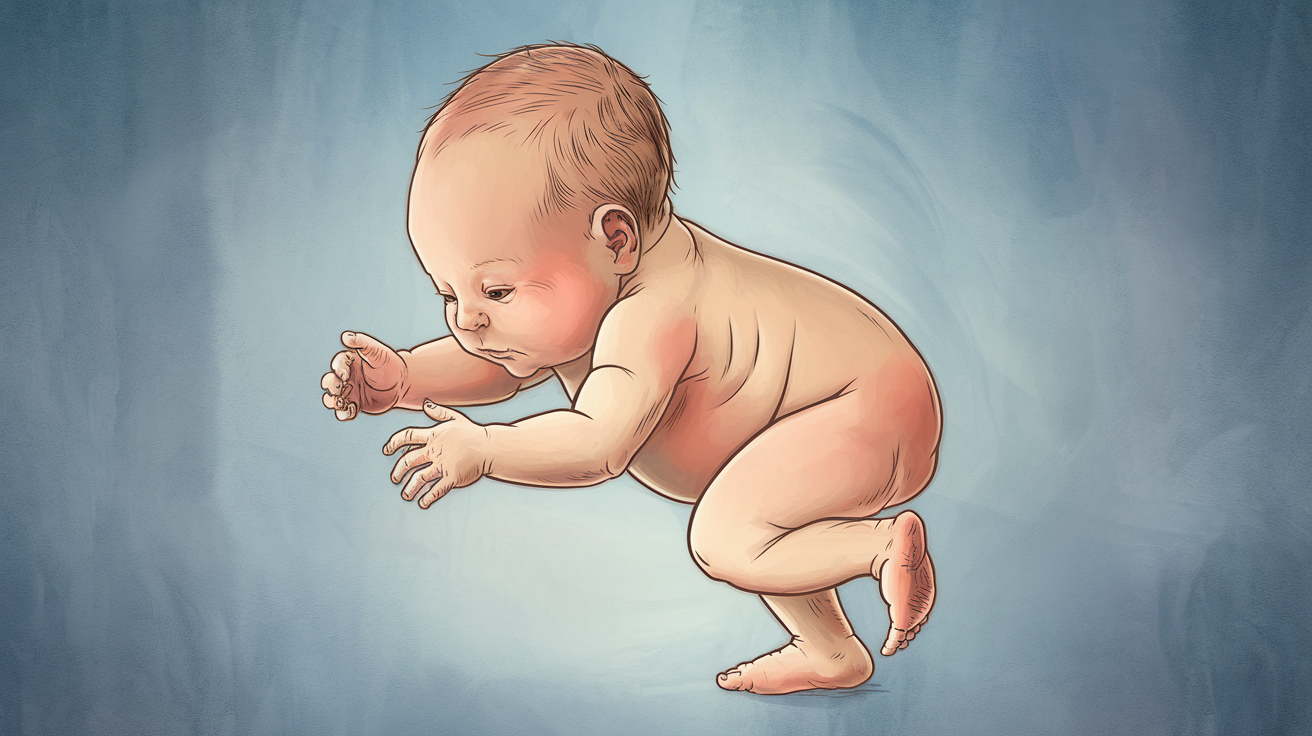
Welcome to the wonderful world of newborn babies! Those first few weeks after birth are super exciting and full of incredible changes. Think of a newborn as a tiny scout learning about the big, brand-new world around them.
During this special time, babies go through some mind-blowing adaptations. They’re figuring out how to use their muscles, recognize voices, and communicate their needs.
Parents are also experiencing an exciting experience, learning how to understand their baby’s unique signals and provide the best care possible. From tiny reflexes to adorable first smiles, the newborn period is like watching a real-life miracle unfold.
Get ready to uncover the magical first month of a baby’s life and learn how these little humans start their incredible experience!
Defining the Newborn Period
The newborn period, officially known as the neonatal period, starts right after a baby is born. According to the World Health Organization (WHO), this special time covers the first 28 days of life.
During these early weeks, babies undergo many important changes as they adjust to life outside the womb.
While medical experts use this four-week timeframe, many parents think of their baby as a “newborn” for a longer time—sometimes up to three or four months. This extended view reflects how parents experience their baby’s early development stages.
- Time of rapid physical adjustment
- An important period for bonding
- Critical for establishing feeding patterns
- Medical professionals use these time distinctions for specific developmental assessments.
- Marked by frequent medical check-ups
Newborn Stage vs. Infancy
Understanding the difference between the newborn stage and infancy helps parents recognize the distinct developmental phases their baby experiences. While these terms are sometimes used interchangeably, they actually refer to different periods in a baby’s early life.
Key Developmental Changes During The Newborn Stage
During the first month, newborns experience rapid development. They begin recognizing voices, particularly their parents, and respond to high-contrast visual patterns.
Reflexes like rooting, sucking, and startling responses are prominent. Physical growth is swift, with some babies gaining 5-7 ounces weekly.
Sleep patterns remain irregular, with 16-17 hours daily in short cycles. Babies gradually develop neck strength, briefly lifting their heads during tummy time.
Motor Function

During the newborn stage, babies display several important physical reflexes like the grasping reflex, where they automatically grip your finger when it touches their palm.
Newborns have a limited range of motion at birth but gradually gain more control over their arms and legs.
Early motor milestones include opening and closing their tiny fists, lifting their heads briefly during supervised tummy time, and kicking their legs when lying on their backs.
These movements help build the muscle strength needed for later development.
- Initial reflexes include grasping, sucking, and startle responses
- Limited motion at birth gradually improves
- Can open and close fists
- Begins to lift head during tummy time
- Kicks legs when placed on the back
Emotional Bonding and Socialization
Early attachments form as newborns begin to respond to their caregivers. These first weeks are crucial for establishing trust and security.
Signs that bonding occurs include crying to express distress or needs, making eye contact with parents or caregivers, and recognizing familiar voices, especially those heard frequently during pregnancy. These early social connections form the foundation for healthy emotional development.
- Early attachments begin forming immediately.
- Cries to express needs or discomfort
- Makes eye contact with caregivers
- Recognizes and responds to familiar voices
- Begins to feel secure when needs are met consistently
Language Exploration

Though newborns don’t speak words yet, they’re already developing pre-language sounds. Cooing, crying, and grunting are all forms of early communication that help babies express themselves.
These sounds are important precursors to later speech and language skills. By responding to these sounds, parents promote language development and teach babies about the give-and-take of conversation.
- No words yet, but pre-language sounds develop
- Uses cooing, crying, and grunting to communicate
- Each sound may indicate different needs
- These are crucial building blocks for future language skills
- Responds to parents’ voices and facial expressions
Sensory Development
Hearing

A newborn’s hearing is fully developed before birth. They can recognize their mother’s voice and other familiar voices they heard while in the womb.
Babies respond to sounds through small noises, slight movements, or subtle facial expressions. They may be calm when hearing familiar voices or music played during pregnancy.
- Hearing is fully developed at birth.
- Recognizes mother’s and other familiar voices
- Responds to sounds with movements or expressions
- May be startled by loud noises
- Finds comfort in rhythmic sounds similar to the womb
Vision

Vision is less mature at birth and refines over the first year. Newborns typically focus best on objects about 8-12 inches away—roughly the distance from a parent’s face while feeding.
They gradually develop recognition of faces, moving objects, and high-contrast colors (especially black and white patterns). Their focus and tracking abilities improve each week.
- Less developed than hearing at birth
- The best focus at 8-12 inches—perfect for seeing the caregiver’s face during feeding
- Gradually recognizes familiar faces
- Attracted to high-contrast colors and patterns
- Vision sharpens noticeably throughout the first months
Feeding

Newborns feed frequently, typically every 2-3 hours around the clock. Cluster feeding—when babies want multiple feeds close together—is common during growth spurts.
When possible, breast milk provides ideal nutrition for newborns, but formula is a valid alternative that provides necessary nutrients. Frequent feedings support rapid growth and development.
- Feeds every 2-3 hours (8-12 times daily)
- Cluster feeding is common during growth spurts
- Breast milk is ideal, but formula is a valid alternative
- Feeding sessions may last 20-40 minutes
- May need waking for feeds if sleeping longer stretches
Sleeping

Newborns sleep approximately 14-17 hours per day, though some sources note they may sleep up to 18-20 hours.
This sleep is typically fragmented into 40-60 minute segments around the clock rather than consolidated into longer stretches.
Night and day confusion is common, as babies haven’t yet developed their circadian rhythm. Sleeping through the night (5-6 hour stretches) often begins around 3 months of age.
- Sleep totals 14-17 hours daily (some say up to 18-20)
- Sleep occurs in short 40-60 minute segments
- There is no established day/night pattern yet
- Night/day confusion is common in the early weeks
- Longer sleep stretches typically develop around 3 months
Meeting Newborns’ Basic Needs
Newborns require consistent attention to their fundamental needs: regular feeding every 2-3 hours, frequent diaper changes, comfortable swaddling, gentle bathing, and plenty of skin-to-skin contact.
Establishing a flexible routine while responding promptly to hunger cues and discomfort helps create a secure environment. Remember that each baby is unique—observe their specific patterns and adjust care accordingly.
1. Adequate Nutrition (Milk)

Newborns need breast milk or formula approximately 8-12 times in 24 hours. The American Academy of Pediatrics recommends exclusive breast milk for the first 6 months when possible.
Growth is monitored primarily through weight gain, with healthy newborns regaining their birth weight by 10-14 days and then gaining approximately a half to one ounce per day on average.
- Breast milk or formula 8-12 times in 24 hours
- AAP recommends exclusive breast milk for 6 months if possible
- Healthy weight gain averages ½-1 ounce daily once birth weight is regained
- Wet diapers indicate adequate hydration
- Regular pediatric check-ups monitor growth patterns
2. Safe Sleep Practices

Safe sleep is essential for newborns. For all sleep periods, always place babies on their backs on a firm, flat surface.
Keep the crib or bassinet free of pillows, blankets, stuffed animals, and other soft items that could pose suffocation risks.
Swaddling can provide comfort and improve sleep if done safely and discontinued once the baby shows signs of rolling.
- Always place baby on back on firm, flat surface
- Keep sleep space free of pillows, blankets, and toys
- Safe swaddling can provide comfort
- Room-sharing (not bed-sharing) is recommended for the first 6 months
- Maintain comfortable room temperature (68-72°F)
3. Diapering and Basic Hygiene

Newborns require frequent diaper changes, often up to 12 times per day. Bathing is needed only 2-3 times per week, as daily baths can dry out a baby’s sensitive skin.
Focus on cleaning the face, neck folds, and diaper area daily, with special attention to the umbilical cord stump until it falls off.
- Change diapers frequently (up to 12 times daily)
- Bathe 2-3 times weekly to avoid drying skin
- Clean face, neck folds, and diaper area daily
- Keep umbilical cord clean and dry
- Use gentle, fragrance-free products made for babies
4. Physical Contact and Comfort

Skin-to-skin contact helps regulate a newborn’s heart rate and body temperature while promoting bonding. Holding, cuddling, and speaking gently to your baby promotes emotional security and brain development. Babies crave this closeness and respond positively to gentle touch.
- Skin-to-skin contact supports physiological regulation.
- Holding and cuddling promotes emotional security
- Gentle speaking helps language development
- Carrying in arms or carriers provides comfort
- Physical contact helps baby feel safe in their new environment
Milestones in the First Two Months
By month two, babies achieve several key milestones. Visual tracking improves as they follow moving objects with their eyes. Social smiles emerge, offering meaningful responses to familiar faces.
Cooing and vowel sounds begin as early communication develops. Head control strengthens with longer periods of head lifting during tummy time.
Newborns start recognizing parents and showing preference for their voices. Hand movements become more deliberate with occasional brief finger grasping.
| Aspect | Milestones |
|---|---|
| By 1 Month | – Increased alertness, though movements remain jerky – Strong reflex movements (startle/Moro, rooting, grasping) – Begins tracking objects at short distances – Recognizes mother’s breast milk scent – More wakeful periods between feeds and sleep |
| By 2 Months | – Social smiles emerge in response to faces or voices – Begins cooing and reacting to loud sounds – Shows improved head control during tummy time – Makes more focused eye contact – Movements become smoother and less jerky |
Tips for Guiding the Newborn Stage
Embrace the chaos of these first weeks by sleeping when your baby sleeps and accepting help from trusted friends and family.
During feeding sessions, keep essentials within arm’s reach. Wear your baby in a carrier to maintain contact while freeing your hands.
Remember that crying is their only communication tool—not a reflection of your parenting.
Trust your instincts; you know your baby best. Most importantly, savor these fleeting moments amid the exhaustion.
Alternate Night Feeds and Responsibilities

When possible, share nighttime duties with your partner or another supportive caregiver.
Even if you’re exclusively breastfeeding, your partner can help by changing diapers, bringing the baby to you for feeds, or soothing the baby back to sleep afterward. This teamwork helps prevent one parent from becoming completely exhausted.
- Share nighttime responsibilities when possible.
- Partners can change diapers or soothe the baby
- Consider pumping so the partner can do occasional feedings
- Take shifts to allow longer rest periods
- Support each other through this challenging time
Focus on Bonding
Prioritize skin-to-skin contact for your baby’s comfort and development. Talk, sing, and make eye contact regularly to strengthen your emotional connection.
These simple interactions build your relationship and support healthy brain development in your newborn.
- Make skin-to-skin contact a daily priority.
- Talk and sing to the baby throughout the day
- Maintain eye contact during alert periods
- Respond consistently to cries and cues
- Enjoy cuddle time without distractions
Lean on Your Support System

Accept assistance from family, friends, or postpartum doulas during this demanding time. Delegate tasks like cooking, cleaning, and laundry to lighten your load.
Remember that accepting help allows you to focus on recovery and bonding with your baby.
- Accept offers of help from family and friends
- Consider hiring postpartum support if available
- Delegate household tasks when possible
- Allow visitors who will actually help
- Join parent groups for emotional support
“Fed Is Best”

While breast milk offers ideal nutrition, formula is a valid option that provides the nutrients babies need.
The main goal is to ensure your baby is adequately nourished and gaining weight appropriately. Choose the feeding method that works best for your family and circumstances.
- Breast milk is ideal, but formula is a valid alternative
- The main priority is adequate nutrition and weight gain
- Combination feeding is also an option
- Consult with healthcare providers about feeding challenges
- Release guilt about feeding choices
Stock Up on Essentials

Keep diapers, wipes, extra clothing, and feeding supplies in easily accessible spots around your home. Consider setting up charging stations in multiple rooms.
A mini-fridge for storing pumped milk or prepared formula near the bedroom can make nighttime feedings more convenient.
- Create multiple changing stations with supplies
- Keep extra clothes accessible for inevitable messes
- Consider a mini-fridge near the bedroom for night feeds
- Prepare bottles or pumping supplies before needed
- Create a portable caddy with essentials for moving from room to room
Don’t Pressure Yourself

Recovery and rest are crucial after childbirth. During this adjustment period, lower your expectations about household chores or “perfect” parenting.
Finding the newborn stage challenging is entirely normal—remember that this intense phase passes more quickly than you might think.
- Prioritize recovery and rest over housework.
- Adjust expectations about what you can accomplish
- Remember that no parent is perfect
- This challenging stage is a temporary
- Focus on progress, not perfection
Final Words
The newborn stage might seem overwhelming, but it’s also an incredible time of love, growth, and new experiences. Remember, every baby is unique, and there’s no such thing as a perfect parent.
What matters most is giving your little one lots of love, patience, and care. These first weeks fly by faster than you can imagine, so try to enjoy the special moments – the tiny yawns, cuddles, and those heart-melting first smiles.
Don’t be afraid to ask for help when you need it. Take care of yourself, and trust your instincts. Every challenge you face is temporary, and you’re doing an amazing job helping your new baby adjust to the world.
You’ve got this, and the incredible experience of parenthood is just beginning!

